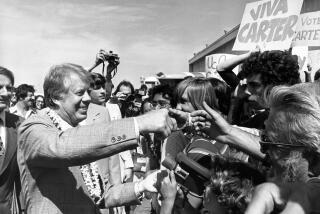Gore, Tidying Up After New York, Makes Peace With the Jackson Camp
- Share via
WASHINGTON — The 1992 campaign for the Democratic presidential nomination may have begun shortly after midnight on April 20 in New York City.
The two losers of the Empire State’s fractious presidential primary did not go to bed after the polls closed and the networks declared Massachusetts Gov. Michael S. Dukakis the winner.
Instead, Sen. Albert Gore Jr., who polled a disappointing 10% in the most racially divisive national campaign since the 1970s, met with the Rev. Jesse Jackson in an hour-long meeting that cleared the way for rapprochement between them.
Gore made more than his share of enemies in this year’s campaign. For example, reacting to news of the Gore debacle, Mark Johnson, former spokesman for Missouri Rep. Richard Gephardt, said of the Tennessee senator, “He ran the most cynical campaign I’ve seen. There’ll be no tears from us.”
The one enemy Gore could not afford was Jackson.
“It was sort of a courtesy call,” said Gerald Austin, Jackson’s street-wise manager, understating the significance of the meeting, which Gore’s egghead handler, Fred Martin, said the two camps had been trying to put together for several days before the election.
Actually, Gore, in his best timing this year, approached Jackson when the Chicago minister was probably at a campaign low. At least one substantial subject was discussed: How Gore would leave the race.
“He explained what the delegate result would be if he withdrew completely or if he suspended his campaign,” said Gore’s manager--an important topic, because Jackson had taken umbrage at Illinois Sen. Paul Simon’s decision to suspend his campaign, as Gore was planning to do. By contrast, Gephardt had formally withdrawn from the race and sent letters to remaining primary states to have his name stricken from ballots.
Whether to exit through Simon’s or Gephardt’s door was significant because of the number of delegates that might shift into either Jackson’s or Dukakis’ columns. Even the delegate counters at the Democratic National Committee were not quite sure how it would come out. At that moment, according to ABC’s count, Dukakis had 1,050 of the 2,081 delegates needed for the nomination. Jackson had 827, Gore 435.
“Jackson made it clear he was satisfied with the decision to suspend,” said Martin. “One could even argue that it advantages Jackson for Gore to stay in the race. More of our 65 super-delegates would probably go to Dukakis than to Jackson (if Gore were to withdraw formally).”
Austin still wants Simon’s 47 at-large delegates in Illinois, and he sneers at Gephardt’s formal withdrawal as being “not a benevolent act,” since Missouri law forced the congressman to surrender unconditionally unless he was willing to sacrifice his seat in the House.
By contrast, the tart-tongued Austin has some surprisingly kind words for Gore, who was the only candidate to stand up to Jackson in the campaign.
“Al Gore learned a lot in 1988,” he said. “It’s got to be a positive for him. I wouldn’t write him off for the future.”
As for the ugly racial undertone of the New York campaign, Austin attributes it to the “megalomania” of Mayor Edward I. Koch, who “was auditioning for a remake of ‘One Flew Over the Cuckoo’s Nest.’ ”
Later that Wednesday, the day before he announced his decision publicly, Gore used the occasion of a $1,000-a-plate fund-raiser in Texas to mischievously echo one of Jackson’s memorable applause lines from his 1984 Democratic National Convention speech: “God is not finished with me yet . . . . My work is incomplete.”
Gore’s immediate task is to reduce his outstanding campaign debt of $1.3 million. The candidate’s education in this race will have cost his backers and U.S. taxpayers more than $11 million.
Next, he will have to raise millions more for his 1990 race for re-election to the Senate. One of Gore’s weaknesses as a national candidate was that in his 12-year political career he had never run a sharply contested race. Right now, he has no viable Republican opposition in Tennessee, but his national race exposed a liberal record, by Tennessee standards, that makes him more vulnerable than before.
The rapprochement with Jackson, so crucial to his national ambitions, is risky, too, since Tennessee’s black population is unusually small for a Southern state. But by giving Gore his blessing to bring his own delegation to Atlanta, Jackson allows the senator to keep local big shots happy.
Gore’s problem in 1988 was that he seemed constantly in danger of being upstaged by many of the powerful personalities in his camp. His wife, Tipper, diverted his campaign in its first week with publication of a book calling for controls on rock-music lyrics, engendering a barrage of First Amendment objections. His father, Albert Gore Sr., resurrected old grudges from his losing 1970 Senate campaign. Martin Peretz, one of Gore’s Harvard mentors and now owner of the New Republic, humiliated his magazine staff by prematurely endorsing the senator. The role of tycoon Armand Hammer in building up the Gore family fortune threatened to become an issue with environmentalists and anti-communists.
The midnight meeting with Jackson showed a maturing shrewdness that the 40-year-old Gore had not displayed before. If he resists the temptation to reach for the vice-presidential nomination and instead uses his assets to unify Democrats at Atlanta, Gore could be remembered as one of the party’s “seven dwarfs” who grew in stature.
More to Read
Get the L.A. Times Politics newsletter
Deeply reported insights into legislation, politics and policy from Sacramento, Washington and beyond. In your inbox twice per week.
You may occasionally receive promotional content from the Los Angeles Times.










